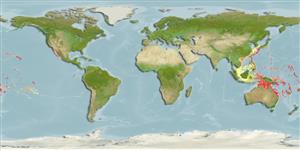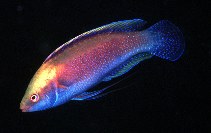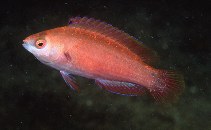Cirrhilabrus punctatus Randall & Kuiter, 1989
Dotted wrasse| Native range | All suitable habitat | Point map | Year 2050 |

|
| This map was computer-generated and has not yet been reviewed. |
| Cirrhilabrus punctatus AquaMaps Data sources: GBIF OBIS |
Pictures | Videos | Stamps, coins, misc. | Google image
Classification / Names Common names | Synonyms | Catalog of Fishes(genus, species) | ITIS | CoL | WoRMS | Cloffa
Etymology: Cirrhilabrus: Latin, cirrus = curl fringe + Greek, labros = furious (Ref. 45335).
More on authors: Randall & Kuiter.
Environment: milieu / climate zone / depth range / distribution range Ecology
Distribution Territories | FAO areas | Ecosystems | Occurrences | Point map | Introductions | Faunafri
Size / Weight / Age
Short description Identification keys | Morphology | Morphometrics
Body shape (shape guide): fusiform / normal; Cross section: compressed.
Life cycle and mating behavior Maturity | Reproduction | Spawning | Eggs | Fecundity | Larvae
Main reference
Upload your references | References | Coordinator : Westneat, Mark | Collaborators
IUCN Red List Status (Ref. 130435: Version 2025-2)
CITES
Threat to humans
Human uses
More information
Food items (preys)
Diet composition
Food consumption
Food rations
Predators
Ecology
Growth parameters
Max. ages / sizes
Length-weight rel.
Length-length rel.
Length-frequencies
Mass conversion
Recruitment
Abundance
Reproduction
Maturity
Maturity/Gills rel.
Fecundity
Spawning
Spawning aggregations
Eggs
Egg development
Larvae
Larval dynamics
Gill area
Brain
Otolith
Body composition
Nutrients
Oxygen consumption
Swimming type
Swimming speed
Visual pigments
Fish sound
Diseases & Parasites
Toxicity (LC50s)
Genome
Genetics
Heterozygosity
Heritability
Genetic Diversity
Tools
Special reports
Download XML






